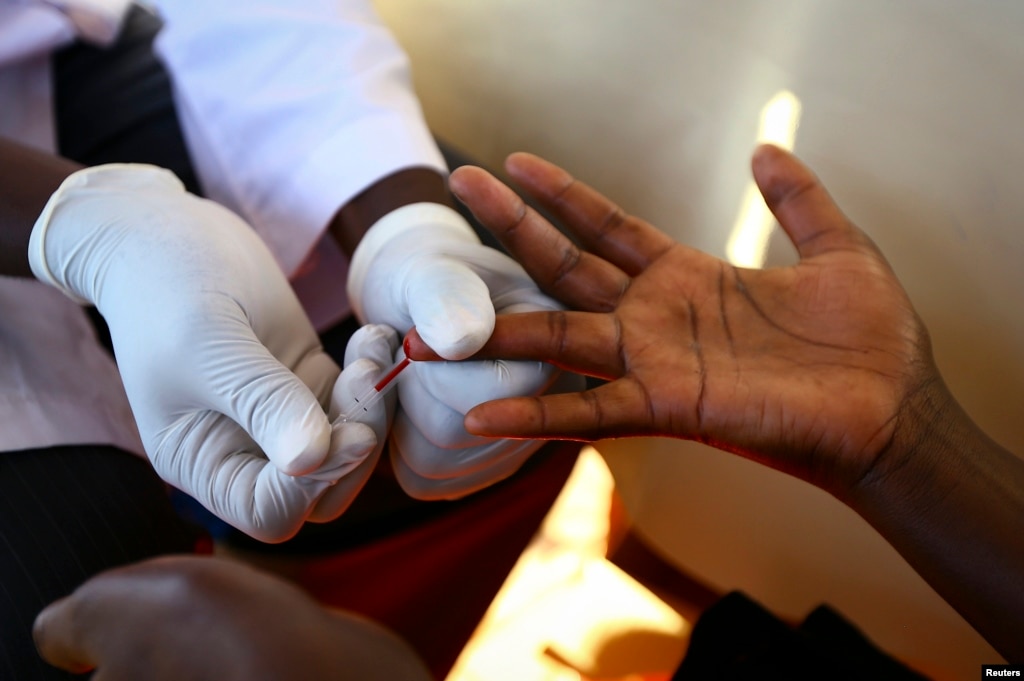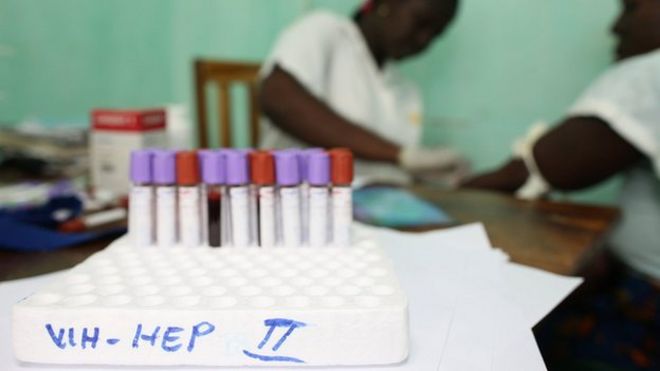Uganda’s government is aiming to launch an ambitious campaign of HIV testing for its citizens.
According to the country’s Minister of Health, the goal is that more than 90% of Ugandans will know their HIV status. The Minister, Dr Elioda Tumwesigye, spoke of the plan on ‘The Truth About AIDS’ on the BBC World Service.
The Minister, Dr Elioda Tumwesigye, spoke of the plan on ‘The Truth About AIDS’ on the BBC World Service.
“We want to give an opportunity to every Ugandan at least one round to say yes or no to an HIV test,” he said.
“We will go to every home, every village, and test.”
Dr Tumwesigye claimed this door-to-door approach to testing counselling had worked well in the Western Ugandan district he represents as a member of parliament.
If the East African country can establish the HIV status of nine out of every ten people, it will have achieved the first of three targets of a new grand initiative led by UNAids (the Joint United Nations programme on HIV/Aids).

HIV/Aids in Uganda
- An estimated 1.7 million people in Uganda are living with HIV
- In 2014, 127,000 people became infected with the virus
- Every hour, seven people in Uganda die because of HIV/Aids

The 90-90-90 strategy is aimed at effectively ending the pandemic by the year 2030, by exploiting the preventative potential of well managed HIV/Aids treatment.
If a patient takes their antiretroviral drugs properly, the amount of virus in the blood and other body fluids is lowered to a level where it is essentially undetectable.
At these levels, the risk of transmitting the virus to other people is much reduced.
The second 90 of the UNAids formula requires that 90% of those identified as HIV positive should be on antiretroviral therapy.
The final criterion is that 90% of the patients on treatment must maintain complete virological suppression.
In other words, therapy must be well enough administered and managed that the virus is unable to replicate in the body.
Five years to go
UNAids has set a goal for countries to implement this regime by 2020.
If nations can achieve this, computer modelling shows that the rate of new infections would be curbed drastically by the year 2030.
The expense of ramping up services might be high in the short-term, but economic benefits are reaped later on as the cost of treating far fewer new patients plummets.
Joshua Musinguzi, head of Uganda’s Aids control programme said that his country has some way to go to reach the targets, but that they are achievable.
“I like them because they are setting a stage for the country to move towards epidemic control.
“The idea now is to move towards an Aids-free generation for Uganda.
“In the last three consecutive years, we have actually enrolled more people on treatment each year than the number of new infections in those years.
“This is a tipping point in the epidemic.”
That is a significant milestone.
Cost
However, Professor Vinand Nantulya, head of the Uganda Aids Commission, points out that currently the number of infected people on treatment is outnumbered by those who are not.
“In Uganda, it’s about 1.7 million people who should be on treatment and so far we are reaching about 800,000”, said Prof Nantulya.
“So we will need [more] money and [more] staff in the hospitals and clinics to put people on treatment, and then we need to follow up those on treatment to be sure that the treatment is having impact on the viral load in the blood.”
Monitoring viral load requires expensive lab equipment that is not available in most Ugandan hospitals and clinics.
More than doubling the number of people on medication will more than double the antiretroviral drugs bill.
Currently about 80% of Uganda’s HIV medication is paid for by international donors while the rest comes from the country’s own coffers.
Both overseas funders and the Ugandan government will need to dig much deeper to meet UNAids’ 90-90-90 targets.
According to Dr Medard Bitekyerezo, deputy chairperson of the Parliamentary Aids committee: “We are looking at levies on bank transactions and interest.
“We are looking at air tickets, beer, soft drinks and even cigarettes,” as examples of goods and services which could be taxed to feed the AIDS fund.
Dr Bitekyerezo stressed: “This money is going to be specifically targeted for HIV-related issues”.
Zimbabwe and Ghana are the only other African countries with similar HIV-dedicated funding mechanisms.
Source: BBC































